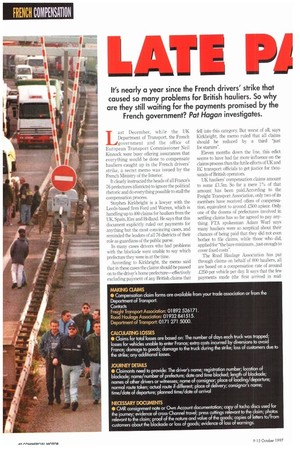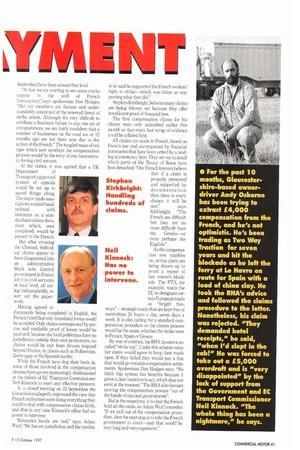FRENCH COMPENSATION It's nearly a year since the French drivers'
Page 42

Page 43

If you've noticed an error in this article please click here to report it so we can fix it.
strike that caused so many problems for British hauliers. So why are they still waiting for the payments promised by the French government? Pat Hagan investigates.
Last December, while the UK Department of Transport, the French government and the office of European Transport Commissioner Neil Kinnock were busy offering assurances that everything would be done to compensate hauliers caught up in the French drivers' strike, a secret memo was issued by the French Ministry of the Interior.
It clearly instructed the heads of all France's 76 prefectures (districts) to ignore the political rhetoric and do everything possible to stall the compensation process.
Stephen Kirkbright is a lawyer with the Leeds-based firm Ford and Warren, which is handling up to 400 claims for hauliers from the UK, Spain, Eire and Holland. He says that this document explicitly ruled out payments for anything but the most convincing cases, and reminded the leaders of all 76 districts of their role as guardians of the public purse.
In many cases drivers who had problems with the blockade were unable to say which prefecture they were in at the time.
According to Kirkbright, the memo said that in these cases the claims should be passed on to the driver's home prefecture—effectively excluding pay. ment of any British claims that
fell into this category. But worst of all, says Kirkbright, the memo ruled that all claims should be reduced by a third "just for starters".
Eleven months down the line, this edict seems to have had far more influence on the claims process than the futile efforts of UK and EC transport officials to get justice for thousands of British operators.
UK hauliers' compensation claims amount to some £1.5m. So far a mere 1% of that amount has been paid.According to the Freight Transport Association, only two of its members have received offers of compensation, equivalent to around £500 apiece. Only one of the dozens of prefectures involved in settling claims has so far agreed to pay anything. FTA spokesman Adam Wurf says many hauliers were so sceptical about their chances of being paid that they did not even bother to file claims, while those who did, applied for "the bare minimum., just enough to cover fixed costs".
The Road Haulage Association has put through claims on behalf of 800 hauliers, all are based on a compensation rate of around £250 per vehicle per day. It says that the few payments made (the first arrived in mid September) have been around that level.
"At last we are starting to see some cracks appear in the wall of French bureaucracy."says spokesman Dan Hodges. -But our members are furious and understandably concerned at the renewed threat of sn-ike action. Although it's very difficult to attribute a business failure to any one set of circumstances, we are fairly confident that a number of businesses on the road six or 12 months ago are not there now due to the action of the French." The tangled mass of red tape which now envelops the compensation process would be the envy of any bureaucracy-loving civil servant.
At the outset, it was agreed that a UK Department of Transport-approved system of appeals would be set up to speed things along. The major trade associations worked hand in-hand with ministers on a stan. dardised claims document which, once completed, would be passed to the French.
But after crossing the Channel, individual claims appear to have disappeared into an administrative black hole. Central government in France left it to civil servants at local level, all acting independently, to sort out the paperwork.
Having agreed to documents being completed in English, the French ruled that only translated forms would be accepted. Only claims accompanied by precise and verifiable proof of losses would be paid and, because the local politicians have no jurisdiction outside their own prefectures, no claims would be met from drivers trapped beyond France, in places such as Folkestone, Zeebrugge or the Spanish border.
While the French have dug their heels in, some of those involved in the compensation process have grown increasingly disillusioned at the failure of EC Transport Commissioner Neil Kinnock to exert any effective pressure.
At a closed meeting on 23 September the Commission allegedly expressed the view that French authorities were doing everything they could to deal with compensation claims fairly, and that in any case Kinnock's office had no power to intervene.
"Kinnock's hands are tied," says Adam Wurf. "He has no jurisdiction and the trouble
1111-111
is he said he supported the French workers' right to strike—which was taken as supporting what they did."
Stephen Kirkbright, believes many claims ai-e being thrown out because they offer insufficient proof of financial loss.
The first compensation claims for his clients were only submitted earlier this month so that every last scrap of evidence could be collated first.
All claims are made in French, based on French law and accompanied by financial statements that have been vetted by a leading accountancy firm. They set out in detail which parts of the Treaty of Rome have been breached. "Our French lawyers believe that if a claim is properly presented and supported by documentation then there is every chance it will be
Stephen Kirkbright: Handling hundreds of claims.
met," says Kirkbright. "The French are difficult but they are no more difficult than the Greeks—or even perhaps the English."
As the compensation row rumbles on, action plans are being drawn up to avoid a repeat of last winter's blockade. The FTA, for example, wants the EU to designate certain European roads as "freight freeways"—strategic roads that are kept free of restrictions 24 hours a day, seven days a week. It is also calling for a standard compensation procedure so the claims process would be the same, whether the strike were in France, Spain or Greece.
By way of contrast, the RHA favours a socalled "strike tax". Under this scheme member states would agree to keep their roads open. If they failed they would pay a fine that would go towards compensation settlements. Spokesman Dan Hodges says: "We think this system has benefits because it gives a clear incentive to act, which does not exist at the moment." The RI-IA also favours moving the compensation process "out of the hands of national governments".
But in the meantime, it is clear the French hold all the cards, as Adam Wurf concedes: "If we pull out of the compensation procedure, then the next step is to take the French government to court—and that would be very long and very expensive."
Neil Kinnock: Has no power to intervene.
MAKING CLAIMS
• Compensation claim forms are available from your trade association or from the
Department of Transport.
Contacts Freight Transport Association: 01892 526171. Road Haulage Association: 01932 841515. Department of Transport 0171 271 5000.
CALCULATING LOSSES • Claims for total losses are based on: The number of days each truck was trap losses for vehicles unable to enter France; extra costs incurred by diversions to avoid France; damage to goods; damage to the truck during the strike; loss of customers due to the strike; any additional losses.
JOURNEY DETAILS • Claimants need to provide: The driver's name; registration number; location of blockade; name/number of prefecture; date and time blocked; length of blockade; names of other drivers or witnesses; name of consignor; place of loading/departure; normal route taken; actual route if different; place of delivery; consignor's name; time/date of departure; planned time/date of arrival NECESSARY DOCUMENTS
• CMR consignment note or Own Account documentation; copy of tacho discs used for the journey; evidence of cross-Channel travel; press cuttings relevant to the claim; photos relevant to the claim; proof of the nature and value of the goods; copies of letters to/from customers about the blockade or loss of goods; evidence oi loss of earnings.
• For the past 10 months, Gloucestershire-based ownerdriver Andy Osborne has been trying to extract £4,000 compensation from the French, and he's not optimistic. He's been trading as Two Way Traction for seven years and hit the blockade as he left the ferry at Le Havre en route for Spain with a load of china clay. He took the RHA's advice and followed the claims procedure to the letter. Nonetheless, his claim was rejected. "They demanded hotel receipts," he said, "when I'd slept in the cab!" He was forced to take out a £5,000 overdraft and is "very disappointed" by the lack of support from the Government and EC Transport Commissioner Neil Kinnock. "The whole thing has been a nightmare," he says.








































































































